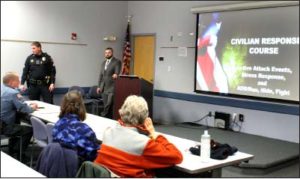Under Attack?
Avoid, Deny, Defend, Officers
Tell Citizen Response Class
By JENNIFER HILL

ONEONTA – Avoid. Deny. Defend.
City Police Sgt. Eric Berger and Detective Joseph Tiemann of the OPD’s Special Response Team repeated the three words frequently during the Active Civilian Response (ACR) training they convened Tuesday, Jan. 22, at Foxcare Center.
The training was open to the public.
Avoid, Deny and Defend (ADD) is the ACR mantra, the three basic and critical actions, developed by Texas State University and used nationwide, that people should take if an attacker intent on committing mass murder targets at their workplace, school, or other location.
Using video clips and analyses of real attacker situations to show what helped people survive mass attacks and tragically, who did not, the two officers said:
• Avoid the attacker by getting out of a building or away from an outside area the attacker has approached as quickly as possible. Always be aware of your surroundings, especially where the closest exits, windows, and other possible escape routes are. Once you quickly see your closest, most accessible escape route, run to it. “Do not hesitate,” Berger said. Once you are safely away from the active attacker, call 911.
• Deny the attacker access. If you did not or were not able to escape before the attacker gets to your location, stop the attacker from getting to it. Lock the door and shut off the lights. “Make it appear you’re not there,” Tiemann said. “A person who wants to kill as many people in as short amount of time as possible will not try to get in a room that is locked or dark. They will go on to the next room to find people.”
If you can’t lock the door, barricade it with the heaviest objects you can find if the door opens from the inside. If the door is pushed in to open it, use straps or belts to secure the door on the inside.
• Defend: If you have to, fight the attacker. That means, do not fight fair. Go for the person’s eyes, throat or groin. Be aggressive. Throw objects at the person to either physically stop them from attacking or even to throw him off-course.
At the same time, the officers discouraged people from trying to take down an attacker if they are not trained in combat unless it’s to survive.
Berger and Tiemann also explained the three stages of “Disaster Response” all people go through, even those who have trained extensively to respond to disasters: Denial, Deliberation, and the Decisive Moment.
When a disaster hits, people first deny it is happening, which slows down their response time, Berger said. “The faster you can go through denial and understand what the disaster is, the better because it allows you to quickly get to the second stage, deliberation.”
In Deliberation, as the name implies, people try to figure out what to do to escape the disaster. Again, acting quickly is paramount. Being aware of your surroundings, what you can access and can’t access especially before an emergency happens will help you act quickly and survive. For example, if you know where windows or emergency doors are and use them to leave a building that is on fire or under attack instead of, say, the main entrance, which may not be the safest route


